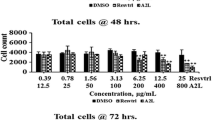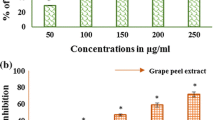Abstract
trans-Resveratrol (trans-R) has been reported to be a potential cancer chemopreventive agent. Although its cytotoxic activity against different cancer cell lines has been tested, its effect on human acute leukemia cell lines has scarcely been investigated, and only a few in vitro studies were performed using human breast epithelial cell lines. Due to its potential value for human health, demand for trans-R has rapidly increased, and new biotechnological strategies to obtain it from natural edible sources have been developed. Thus, grapevine cell cultures represent a reliable system of trans-R production since they biosynthesize trans-R constitutively or in response to elicitation. In addition, there are no studies deepen on the inhibitory effect of trans-R, produced by elicited grapevine cell cultures, on growth of human tumor cell lines. In this work, the effect of trans-R extracted from the culture medium, after elicitation of grapevine cell cultures, was tested on two human acute lymphocytic and monocytic leukemia cell lines, and one human breast cancer cell line. The effect of trans-R on cell proliferation was not only dose- and time-dependent but also cell type-dependent, as seen from the different degrees of susceptibility of cancer cell lines tested. As regards the effect of trans-R on cell cycle distribution, low trans-R concentrations increased cells in the S phase whereas a high trans-R concentration increased G0/G1 phase in all cell lines. Perturbation of the cell cycle at low trans-R concentrations did not correlate with the induction of cell death, whereas a high trans-R concentration, cell proliferation decreased as a result of increasing apoptosis in the three cell lines. In leukemia cells, trans-R up-regulated the expression of caspase-3 while trans-R-induced apoptosis in breast cells occur through a caspase-3-independent mechanism mediated by a down-regulation of Bcl-2.




Similar content being viewed by others
Abbreviations
- CDs:
-
Cyclodextrins
- IC50 :
-
Median inhibitory concentration
- trans-R:
-
trans-Resveratrol
References
Jang M, Cai L, Udeani GO, Slowing KV, Thomas CF, Beecher CW, Fong HH, Farnsworth NR, Kinghorm AD, Mehta RG, Moon RC, Pezzuto JM (1997) Cancer chemopreventive activity of resveratrol, a natural product derived from grapes. Science 275:218–220
Vang O, Ahmad N, Baile CA, Baur JA, Brown K, Csiszar A, Das DK, Delmas D, Gottfried C, Lin HY, Ma QY, Mukhopadhyay P, Nalini N, Pezzuto JM, Richard T, Shukla Y, Surh YJ, Szekeres T, Szkudelski T, Walle T, Wu JM (2011) What is new for an old molecule? Systematic review and recommendations on the use of resveratrol. PLoS One 6:e19881
Mikstacka R, Rimando AM, Ignatowicz E (2010) Antioxidant effect of trans-resveratrol, pterostilbene quercetin and their combinations in human erythrocytes in vitro. Plant Foods Hum Nutr 65:57–63
Giovinazzo G, Ingrosso I, Paradiso A, De Gara L, Santino A (2012) Resveratrol biosynthesis: Plant metabolic engineering for nutritional improvement of food. Plant Foods Hum Nutr 67:191–199
Okawara M, Katsuki H, Kurimoto E, Shibata H, Kume T, Akaike A (2007) Resveratrol protects dopaminergic neurons in midbrain slice culture from multiple insults. Biochem Pharmacol 73:550–560
Pezzuto JM (2008) Resveratrol as an inhibitor of carcinogenesis 1, 2. Pharmaceut Biol 46:443–573
Singh N, Nigam M, Ranjan V, Sharma R, Balapure AK, Rath SK (2009) Caspase mediated enhanced apoptotic action of cyclophosphamide-and resveratrol-treated MCF-7 cells. J Pharmacol Sci 109:473–485
Komina O, Wesierska-Gadek J (2008) Action of resveratrol alone or in combination with roscovitine, a CDK inhibitor, on cell cycle progression in human HL-60 leukemia cells. Biochem Pharmacol 76:1554–1562
Jazirehi AR, Bonavida B (2004) Resveratrol modifies the expression of apoptotic regulatory proteins and sensitizes non-Hodgkin’s lymphoma and multiple myeloma cell lines to paclitaxel-induced apoptosis. Mol Cancer Ther 3:71–84
Belchí-Navarro S, Almagro L, Lijavetzky D, Bru R, Pedreño MA (2012) Enhanced extracellular production of trans-resveratrol in Vitis vinifera suspension cultured cells by using cyclodextrins and methyljasmonate. Plant Cell Rep 31:81–89
Calderón AA, Zapata JM, Muñoz R, Pedreño MA, Ros-Barceló A (1993) Resveratrol production as a part of the hypersensitive-like response of grapevine cells to an elicitor from Trichoderma viride. New Phytol 124:455–463
Lijavetzky D, Almagro L, Belchí-Navarro S, Martínez-Zapater JM, Bru-Martinez R, Pedreño MA (2008) Synergistic effect of methyljasmonate and cyclodextrin on stilbene biosynthesis pathway gene expression and resveratrol production in Monastrell grapevine cell cultures. BMC Res Notes 1:132–136
Fernández-Pérez F, Almagro L, Pedreño MA, Gómez Ros LV (2012) Synergistic and cytotoxic action of indole alkaloids produced from elicited cell cultures of Catharanthus roseus. Pharmaceut Biol. doi:10.3109/13880209.2012.722646
Joe AK, Liu H, Suzui M, Vural ME, Xiao D, Weinstein IB (2002) Resveratrol induces growth inhibition, S-phase arrest, apoptosis, and changes in biomarker expression in several human cancer cell lines. Clin Cancer Res 8:893–903
Lee SK, Zhang W, Sanderson BJS (2008) Selective growth inhibition of human leukemia and human lymphoblastoid cells by resveratrol via cell cycle arrest and apoptosis induction. J Agric Food Chem 56:7572–7577
Bradford MM (1976) A rapid and sensitive method for the quantitation of microgram quantities of protein utilizing the principle of protein-dye binding. Anal Biochem 72:248–254
Jiménez-Atiénzar M, Pedreño MA, Caballero N, Cabanes J, García-Carmona F (2007) Characterization of polyphenol oxidase and peroxidase from peach mesocarp (Prunus persica L. cv. Babygold). J Sci Food Agric 87:1682–1690
Wesierska-Gadek J, Kramer MP, Maurer M (2008) Resveratrol modulates roscovitine-mediated cell cycle arrest of human MCF-7 breast cancer cells. Food Chem Toxicol 46:1327–1333
Vitrac X, Desmouliere A, Brouillaud B, Krisav S, Deffieux G, Barthe N, Rosenbaum J, Mérillon JM (2003) Distribution of [14C]-trans-resveratrol, a cancer chemopreventive polyphenol, in mouse tissues after oral administration. Life Sci 72:2219–2233
Wenzel E, Somoza V (2005) Metabolism and bioavailability of trans-resveratrol. Mol Nutr Food Res 49:472–481
Cakir Z, Saydam G, Sahin F, Baran Y (2011) The roles of bioactive sphingolipids in resveratrol-induced apoptosis in HL60 acute myeloid leukemia cells. J Canc Res Clin Oncol 137:279–286
Nagakawa H, Kiyozuka Y, Uemura Y, Senzaki H, Shikata N, Hioki K, Tsubura A (2001) Resveratrol inhibits human breast cancer cell growth and may mitigate the effect of linoleic acid, a potent breast cancer cell stimulator. J Cancer Res Clin Oncol 127:258–264
Pozo-Guisado E, Alvarez-Barrientos A, Mulero-Navarro S, Santiago-Josefat B, Fernandez-Salguero PM (2002) The antiproliferative activity of resveratrol results in apoptosis in MCF-7 but not in MDA-MB-231 human breast cancer cells: Cell-specific alteration of the cell cycle. Biochem Pharmacol 64:1375–1386
Basly JP, Marre-Fournier F, Le Bail JC, Habrioux G, Chulia AJ (2000) Estrogenic/antiestrogenic and scavenging properties of (E)-and (Z)-resveratrol. Life Sci 66:769–777
Pozo-Guisado E, Lorenzo-Benayas MJ, Fernandez-Salguero PM (2004) Resveratrol modulates the phosphoinositide 3-kinase pathway through an estrogen receptor α-dependent mechanism: Relevance in cell proliferation. Int J Cancer 109:167–173
Locatelli GA, Savio M, Forti L, Shevelev I, Ramadan K, Stivala LA, Vannini V, Hübscher U, Spadari S, Maga G (2005) Inhibition of mammalian DNA polymerases by resveratrol: Mechanism and structural determinants. Biochem J 389:259–268
Holmes-McNary M, Baldwin AS Jr (2000) Chemopreventive properties of trans-resveratrol are associated with inhibition of activation of IκB kinase. Cancer Res 60:3477–3483
Yang J, Liu X, Bhalla K, Kim CN, Ibrado AM, Cai J, Peng TI, Jones DP, Wang X (1997) Prevention of apoptosis by Bcl-2: Release of cytochrome c from mitochondria blocked. Science 275:1129–1132
Brakenhielm E, Veitonmaki N, Cao R, Kihara S, Matsuzawa Y, Zhivotovsky B, Funahashi T, Cao Y (2004) Adiponectin-induced antiangiogenesis and antitumor activity involve caspase-mediated endothelial cell apoptosis. Proc Natl Acad Sci USA 101:2476–2481
Janicke RU (2009) MCF-7 breast carcinoma cells do not express caspase-3. Breast Cancer Res Treat 117:219–221
Pozo-Guisado E, Merino JM, Mulero-Navarro S, Lorenzo-Benayas MJ, Centeno F, Alvarez-Barrientos A, Fernández-Salguero PM (2005) Resveratrol-induced apoptosis in MCF-7 human breast cancer cells involves a caspase-independent mechanism with downregulation of Bcl-2 and NF-κB. Int J Cancer 115:74–84
Acknowledgments
F. Fernández-Pérez and L. Almagro have grants from the MICINN. This study was supported by the Fundación Séneca, Agencia de Ciencia y Tecnología de la Región de Murcia en el marco de II PCTRM 2007-10 (08799/PI/08) and by MICINN-FEDER (BIO2008-2941 and BIO2011-29856-C02-02).
Author information
Authors and Affiliations
Corresponding author
Additional information
Francisco Fernández-Pérez, Sarai Belchí-Navarro and Lorena Almagro contributed equally to this work.
This work is dedicated in memoriam of Prof. Alfonso Ros-Barceló our mentor and friend.
Rights and permissions
About this article
Cite this article
Fernández-Pérez, F., Belchí-Navarro, S., Almagro, L. et al. Cytotoxic Effect of Natural trans-Resveratrol Obtained from Elicited Vitis vinifera Cell Cultures on Three Cancer Cell Lines. Plant Foods Hum Nutr 67, 422–429 (2012). https://doi.org/10.1007/s11130-012-0327-8
Published:
Issue Date:
DOI: https://doi.org/10.1007/s11130-012-0327-8




